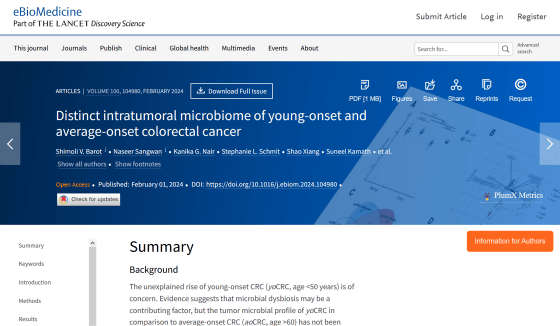The type of intestinal bacteria associated with colorectal cancer in young people has been identified, and it may be possible to detect signs of colorectal cancer without an endoscopy.

Colorectal cancer is generally more common in middle-aged people aged 40 to 50 or older, but this does not mean that younger people do not develop the disease, and early detection occurs in young people who are less likely to undergo colorectal cancer screening. The difficulty of this has become an issue. A new study has revealed that the types of intestinal bacteria that live in tumors are different between patients under 50 and over 50, even in the same colorectal cancer patient, which is expected to provide clues for early diagnosis.
Distinct intratumoral microbiome of young-onset and average-onset colorectal cancer - eBioMedicine

Gut bacteria linked to colorectal cancer in young people | Live Science
https://www.livescience.com/health/cancer/gut-bacteria-linked-to-colorectal-cancer-in-young-people
A research team at the Cleveland Clinic Taussig Cancer Center in the United States studied 136 patients with colorectal cancer under the age of 50 (median age 43 years) and 140 patients with colorectal cancer over the age of 50 years (median age 73 years). We conducted a survey on the intestinal flora of the subjects.
The research team analyzed colorectal cancer tumors and surrounding non-cancerous tissue taken from subjects to determine what types of intestinal bacteria are thriving within colorectal cancer tumors in young and middle-aged people. did. The results showed that tumor tissue contained fewer types of intestinal bacteria than surrounding tissue in all age groups, and that the loss of diversity was more severe in the older age group. Cancer tumors are prone to inflammation due to attacks by the immune system, and the environment tends to be hypoxic, so it is thought that there are few intestinal bacteria that can survive.
We also found that the types of intestinal bacteria that live in tumors differ depending on the type of colorectal cancer (colon cancer, rectal cancer, etc.), and that the types of intestinal bacteria that live in young and middle-aged people differ. I did. For example, a group of intestinal bacteria called Akkermansia was found to be more common in young patients and mainly lived in small tumors. Studies on mice have shown that ingestion of cultured Akkermansia species inhibits the growth of cancer tumors, and researchers believe that these intestinal bacteria may be inhibiting tumor growth in some way. I'm guessing there is.

The results of this study reveal the correlation between specific intestinal bacteria and colorectal cancer, but it is unclear whether specific intestinal bacteria cause or prevent the progression of colorectal cancer. Unknown. We also still don't know what these gut bacteria do in tumors, or why certain species are more likely to thrive in tumors. 'This is exactly what we need to understand using mechanistic studies,' said lead author Nazia Sangwan, a microbiologist at the Lerner Institute at the Cleveland Clinic.
Laura Valle of Spain's
The results of this study may also lead to the development of early diagnosis methods for colorectal cancer in young people. If we can find out what kind of intestinal bacteria are found in colorectal cancer tumors, we may be able to detect intestinal bacteria associated with colorectal cancer in fecal samples and narrow down the number of people who should undergo cancer screening tests. he claimed.

Related Posts:
in Science, Posted by log1h_ik







